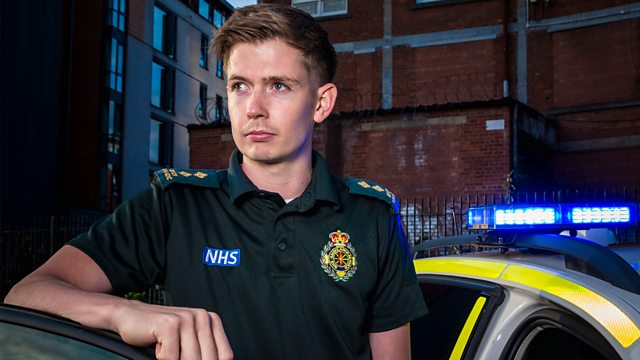It’s Easter bank holiday weekend, and the ambulance service receive a spike in the number of mental health-related calls.
It’s Easter bank holiday weekend and the start of the new 12-hour day shift for the North West Ambulance Service. Looking after the communities of central Manchester and Salford are dispatchers Mel and Nat in control. Paramedics Ash and Sarah, Jill and Lewis, and senior paramedic Jack are on the road.
The first call of the shift is for a baby coming out bottom first. A breach birth is classed as a category 1 emergency. Senior paramedic Jack is immediately dispatched, along with an advanced paramedic and two ambulance crews. The caller reports the baby has come out but isn’t breathing. Fortunately, another crew arrive first and are able to get the baby breathing. Jack arrives in time to wrap the baby up, check her over and hand her to her relieved parents.
It’s halfway through the shift, and over 300 patients are waiting for an ambulance. Jill and Lewis have been dispatched to a dementia patient who has her eyes closed and won’t open them. After some gentle persuasion, the patient does open her eyes, but Jill and Lewis turn their attention to husband and full-time carer, who they realise needs help accessing support for both of them. He talks movingly about it being a 'long goodbye' as he slowly loses the woman he loves. The update to Nat in control really hits home. She reflects, 'because we are so busy, sometimes you don’t get time to think, you’re dealing with what’s in front of you... it’s only when you take a step back that you remember what’s going on.'
As bank holiday Monday begins, senior paramedic Jack is dispatched to a male who is possibly having a seizure. He’s faced with an agitated patient who is becoming aggressive and throwing objects. Jack requests police backup while he and the crew step outside for their own safety.
As Jack and the crew wait for the police, the service is experiencing high demand. Nearly 200 people across the north west are waiting for an ambulance, up a third since the start of the shift.
At last, the police arrive at the scene to help Jack with his patient, who continues to appear agitated. Jack decides he lacks capacity, so the best place for him is in hospital, where he can be treated by mental health specialists.
Staff in control are noticing that the volume of mental health calls appears to be higher today. They discuss whether holidays lead to the increase – while a happy time for many, for those without families, they can be a huge struggle. The statistics bear this out, as during bank holidays, the North West Ambulance Service sees a 12 per cent rise in people calling about their mental health.
Ash and Sarah are called to a patient who is feeling suicidal. He had first made a call for help seven hours earlier. On arrival, they discover the patient has suffered a lot of loss in the last year while struggling with alcohol addiction. Because the patient is talking about harming himself, Ash makes the decision to take him to be seen by the mental health team at Salford Royal. En route, Sarah opens up about her own experience with alcohol dependency. Her brother, who has now sadly died, turned to alcohol when he lost his daughter. 'Bereavement can hit people in so many ways... it can be a really dark, lonely world if you don’t have anybody there next to you.'
Across the city, Jill and Lewis are dispatched to a homeless hostel to see a patient with breathing problems, who has been vomiting for two days. The patient has been through a lot in her life, and the team quickly realise her mental health is deteriorating. Due to the bank holiday and many services being closed, the paramedics experience huge frustration trying to access the right service for their patient. After multiple calls, they eventually manage to put a referral in place to ensure she’s contacted by the right team. Only then do they decide it is safe to leave the patient at home.
Filmed during a bank holiday weekend, this episode highlights how the ambulance service will turn up without fail and are always there in an emergency even when other services are closed. It highlights the prevalence of the mental health crisis in the north west – particularly exposed to the ambulance service on weekends and bank holidays – and showcases how the dispatchers' and ambulance crews' own life experiences can be drawn on to offer real comfort to those in desperate need.
Last on
Clip
-
![]()
A 'long goodbye'
Duration: 01:57
Credits
| Role | Contributor |
|---|---|
| Narrator | Christopher Eccleston |
| Executive Producer | Simon Ford |
| Executive Producer | Peter Wallis-Tayler |
| Series Producer | Tasha McLintock |
| Series Editor | James Robinson |
| Director | Dan Nightingale |
| Production Company | Dragonfly Film and Television |
Broadcasts
- Wed 13 Mar 2024 21:00Βι¶ΉΤΌΕΔ One except Nightlight
- Tue 19 Mar 2024 00:10Βι¶ΉΤΌΕΔ One except Northern Ireland, Northern Ireland HD, Scotland, Scotland HD, Wales & 2 more
- Tue 19 Mar 2024 00:55Βι¶ΉΤΌΕΔ One Scotland HD & Scotland only
- Sat 10 Aug 2024 00:45


